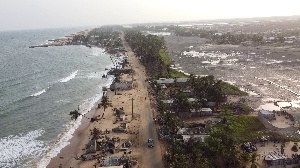- Home - News
- Elections 2024
- News Archive
- Crime & Punishment
- Politics
- Regional
- Editorial
- Health
- Ghanaians Abroad
- Tabloid
- Africa
- Religion
- Photo Archives
- Press Release
General News of Tuesday, 6 May 2025
Source: www.ghanawebbers.com
Ghana’s coastal communities on the frontlines of climate change
Climate change is worsening. Global temperatures are breaking records. Extreme weather events like droughts, floods, and storms are increasing. These changes threaten socio-economic development.
Scientists report that ocean heat content has reached a new high. This contributes to rising sea levels and coral bleaching. Coastal communities and ecosystems face significant risks.
Ghana is particularly vulnerable to climate change impacts. The country relies on agriculture, energy, and forestry, which are sensitive to climate changes.
The Volta Basin's water volume may drop by 24% by 2050. By 2100, it could decrease by 45%. This will affect hydropower generation and access to clean drinking water.
Ghana's greenhouse gas emissions are low at about 0.1% of global totals. However, the effects of climate change are already evident in the country.
Since 1960, Ghana's temperature has risen by 1.0 °C. Northern regions are warming faster than southern areas. Rainfall patterns have become unpredictable, leading to droughts and floods across the nation.
Flooding affects around 45,000 Ghanaians each year. The coastline faces erosion and flooding due to rising sea levels. Projections show increases of 5.8 cm by 2020, 16.5 cm by 2050, and 34.5 cm by 2080.
Coastal communities in Ghana struggle with severe climate impacts. Rising sea levels and intensified tidal waves cause significant coastal erosion. Homes and livelihoods are threatened as these communities face existential challenges.
In Agavedzi, a coastal town in the Volta Region, residents see their homes disappearing into the sea. Recently, over 50 houses were lost, displacing about 300 people.
Erosion has also disturbed cemeteries; over 100 bodies need reburial now. Despite calls for government help like building sea barriers, assistance remains limited.
The destruction of homes disrupts local economies too. In Agavedzi, an eatery owner faces business collapse due to erosion threats. Residents express sadness and uncertainty about their future amid these challenges.
Beyond erosion issues, pollution further degrades Ghana's coastal regions.
In Accra’s Old Fadama area, textile waste pollutes water bodies like Korle Lagoon.
This pollution harms marine ecosystems and increases vulnerability for coastal communities.
The situation highlights the urgent need for effective climate adaptation strategies in Ghana.
These strategies should include building sea defenses and sustainable waste management practices.
Support for affected populations is essential as well.
As climate change threatens coastal regions more severely,
Ghana must prioritize protecting its coastal communities for their future survival.
Engaging local communities in planning is crucial for effective interventions.
Residents should actively protect their future against climate change impacts.
Restoring coastal ecosystems like mangroves can help stabilize shorelines.
Implementing eco-friendly fishing methods can maintain fish populations too.
Creating marine reserves will preserve critical habitats along coastlines as well.











